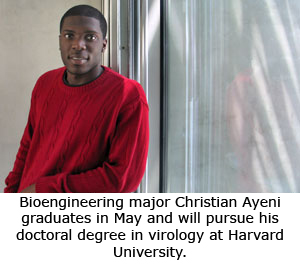

UC Merced
bioengineeringmajor Christian Ayeni had nearly decided against applying to Harvard University’s virology program last fall. Not only was it an Ivy League school, he reasoned, it was charging an application fee about twice what he had been paying at other universities.
Still, something deep inside him said, go for it.
Roughly two weeks after submitting his application, he was lying in bed, recovering from finals when his cell phone rang. He cleared his throat when he didn’t recognize the number. The representative from Harvard invited him to visit the campus for an interview. During the interview weekend, Ayeni impressed Harvard, despite some jitters, and was accepted into its virology program. He’ll begin pursuing his doctoral degree in the fall.
“They have an exceptional program,” Ayeni explained. “There’s so much depth with so many professors doing so many different things.”
Ayeni thinks one of the main reasons he was accepted was because of the
research opportunitieshe had as a UC Merced undergraduate. During his sophomore summer he interned with the
Center of Intergrated Nanomechanical Systemsworking on a project with a UC Berkeley professor. Ayeni was also accepted into the UC Merced
Leadership Excellence through Advanced Degrees(LEADS) program as well as the
Ronald E. McNair Scholarsprogram.
Although Ayeni will be graduating with a degree in bioengineering, he decided to shift toward
biological sciencesbecause it was a better fit for his interests. During his fourth year, while considering his future as a professional, he learned that a friend’s father died from HIV complications. An uncle in Nigeria also fell victim to the virus.
Ayeni realized studying HIV, or other viruses ravaging underdeveloped countries, was his calling. He began taking more virology-related classes and looking for opportunities to expand his knowledge of virology and immunology.
The LEAD program allowed him to spend a summer working with Bruce E. Torbett at the Scripps Research Institute, where he participated in research with the HIV protease enzyme.
After he graduates on May 15, Ayeni plans to spend the summer at home, continuing to learn more about the virology field. He is currently unsure of his plans after graduate school. Some of his options include pursuing a position with a national laboratory, heading into academia or working for a private company.
Whatever his decision, he’ll be following that voice deep inside himself.






